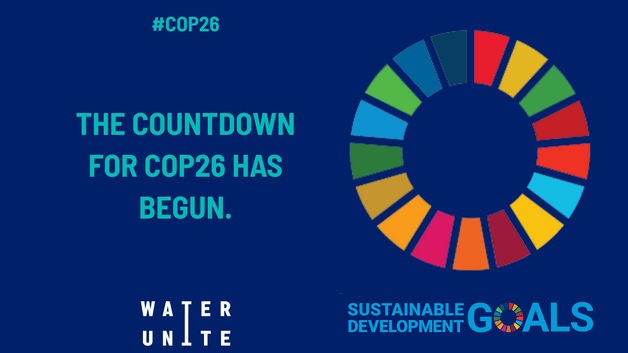The final countdown is on for COP26, described as ‘the world’s best last chance to get runaway climate change under control’. With just days to go ahead of the October 31st start date the final events and panels are being added to the Green Zone agenda.
We are delighted to see water-related topics being featured in these new additions. However, considering how closely water and climate change are linked, it was concerning that only one ‘water’ event directly relating to climate change and carbon was included in the original agenda. Having a strategy for our water resources, systems and infrastructures in relation to climate change is vital for our transition to a net zero society and shouldn’t be considered as an afterthought.
Our global carbon footprint affects and is affected by our natural resources and their connected systems. Increasing or even maintaining our current rates of carbon consumption will accelerate and worsen the effects of climate change which in turn will increase incidences of water scarcity. In 2020, it was estimated that around 1.5 billion people suffered from water scarcity or drought across the world as a consequence of climate change in combination with rising demand for clean and safe water. At current rates, 57% of the world’s population will live in water stressed areas by 2050 (UN World Water Development Report 2018). This will damage communities and destroy livelihoods in some of the world’s poorest regions.
In order to decrease the amount of people suffering from water scarcity as a result of climate change, the entire water supply network needs to be reassessed and proactively changed to be sustainable over the long term. This particularly includes the sectors that use water as a primary input, such as energy and mining. Companies involved in energy, pharmaceuticals, mining, apparel, food and agriculture sectors are also responsible for a total of 70% of the world’s total water usage (CDP Global Water Report 2020).
Water and its management also contribute significantly to the rate of climate change. The water sector contributes 3-7% of global greenhouse gas emissions by treatment of wastewater alone (Harvey 2020). This impact is estimated to be larger than the aviation sector’s footprint and doesn’t include other elements of its supply network such as its transportation.
The carbon footprint of the water sector, if left unchecked, has the potential to increase incidences of water scarcity. This inevitably harms many communities in developing nations who are already susceptible to water scarcity and may not have the infrastructure to mitigate or combat it. Even though trillions of dollars have been invested in the energy sector to produce greener and more sustainable energy, far fewer resources have been directed towards the water sector in order to reduce its global emissions.
Some positive changes within the water industry can already be seen. Whilst the water industry has managed to reduce its carbon footprint by 45% between 2011 and 2019 according to Water.org 2020, it remains a large contributor to climate change with 3-7% of global GHGs through the treatment of wastewater, still larger than the aviation sector.
Whilst this trending environmental attitude is encouraging to see, larger infrastructural change will play a massive part in reaching committed sustainability targets and preventing water scarcity world-wide. We must see further action not just words at COP26 and beyond. It is vital that political leaders create a solidified road map to a sustainable future with a secure climate and secure water resources.
We find ourselves in what many panellists at climate debates describe as the ‘decisive decade’ of climate action. We cannot have a ‘green’ recovery without a plan for a ‘blue’ recovery which holistically addresses the climate of water.
References
CDP, 2020. CDP Global Water Report. [online]. Available at:
Thomas, B.F., Famiglietti, J.S. (2019) Identifying Climate-Induced Groundwater Depletion in GRACE Observations. Sci Rep 9, 4124. Available at: https://doi.org/10.1038/s41598-019-40155-y
Waterwise.org.uk. 2019. At Home With Water (2013) – Waterwise. [online]
Water.org.uk. 2020. Water industry launches world’s first sector-wide plan to deliver net zero carbon emissions by 2030. [online] Available at:
Harvey, F., 2021. Poor water infrastructure puts world at greater risk from coronavirus. The Guardian, [online] Available at:

